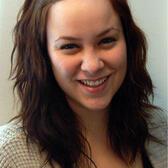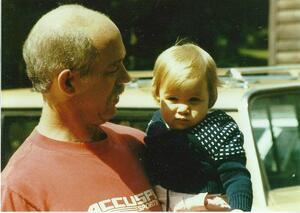My father’s daughter, my mother’s faith
This year, Father’s Day falls on June 17th, just two days before the 17th anniversary of my father’s death. A lifelong smoker, he died of complications related to lung cancer when he was only 45 years old. I was just 10 years old, and that year, Father’s Day came just one day before his death. Though he was weak and confined to a hospital bed, that didn’t stop me from bringing him an ice cream sundae to celebrate the holiday and to let him know that sick or not, I thought he was the best dad around.
I am now almost 28 years old and, by most life metrics, a successful, happy, and Jewishly engaged young adult. People sometimes tell me my father would be proud of me; though I want to feel complimented, I can’t help but instead feel that these people know not of what they speak. Of course, I like to think they’re right – and in fact, I think they’re probably right, too – but how can anyone know whether my father would be proud of me? And aren’t most fathers proud of their daughters? Is this a compliment at all?
More importantly, though, “Your dad would be proud of you” always gets me wondering: What would my life would be like had my father lived? Who would I be? What would I be doing? And… would I be this Jewish? My dad was a secular Christian, the kind who valued the traditions of Christmas and Easter but rarely if ever set foot into a church; he agreed to raise his children (as it turns out, I was the only one!) in the Jewish faith, per my mother’s request, but he had little to do with my religious education. Other non-Jewish dads sometimes came to synagogue with their families, but to my memory, mine never did.
Everything that has happened in my almost-28 years has led me to where I am today – my dad’s death perhaps most of all. His passing shaped my relationship with my mother, which in turn shaped the way I view and value Judaism, which ultimately led me to engage further with the Reform Movement. When I think back on the series of events in my life that led me to the place I’m in now – namely, five years into working for the Reform Movement – I can’t help but think that, were my dad alive, it’s likely that none of them would ever have happened.
Don’t get me wrong, this is of course not to say that I’m glad he died; even 17 years later, I miss my father and the idea of having a father every single day. Still, I recognize that in some other version of my life, perhaps, the “Sliding Doors” version (remember that Gwyneth Paltrow movie from the ‘90s?), my dad is alive and cancer-free, and I am doing who-knows-what, working who-knows-where. In that version of my life, it never occurs to me to wonder what might’ve happened if my father had died; it never occurs to me that I could be doing anything else. As it stands, though, this is my life. This is what the universe chose for me. I may miss my dad, but I do not mourn for the life I might’ve had if he’d lived, if only because I cannot imagine leading any life other than this one.
My father may not have meant to have much to do with my religious upbringing – but as it turns out, he had everything to do with it.







